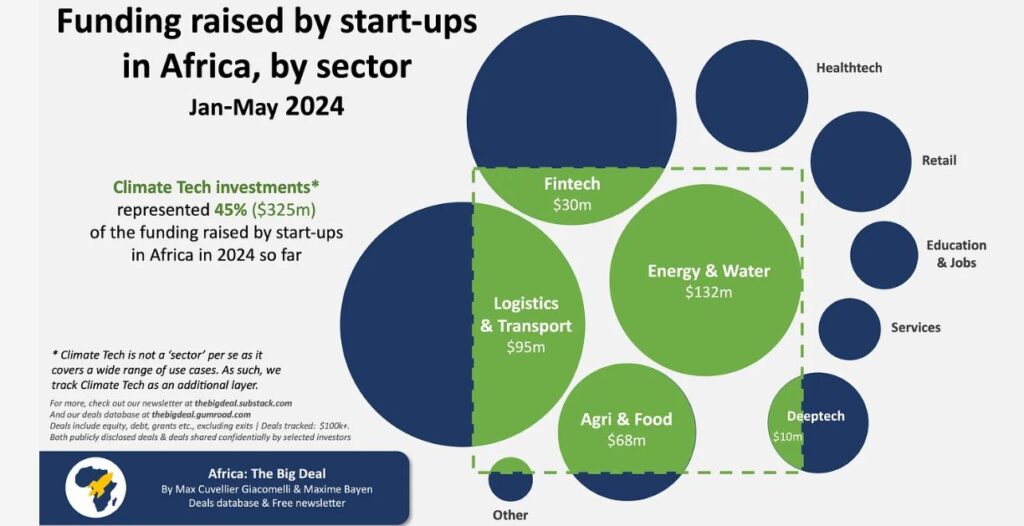- In 2024, startup funding in Africa has evolved with Climate tech, which covers various use cases, surging to account for 45% of funding, an all-time high.
- In the period under review, climate tech received $325 million.
- Despite the overall dip in total investments, climate tech’s share of funding has been steadily rising, reflecting its expanding importance in Africa’s startup scene.
In the face of increasing economic woes and adverse weather conditions, climate tech startups in Africa are defying the odds, instead, experiencing unprecedented levels of investment. This year, climate tech is emerging as a primary focus for investors, reflecting the urgent need for innovative solutions to address the continent’s climate-related issues.
The latest numbers show that climate tech startups garnered substantial attention in 2024, with funding reaching an all-time high of $325 million, which is 45 percent of the total startup financing announced in Africa this year.
“But what’s particularly interesting is to look at the proportion of funding that is going to ventures that can be considered as ‘Climate Tech’. Climate Tech is not so much a ‘sector’ per se as it covers a wide range of use cases,” explains an analysis from Africa: The Big Deal by Max Cuvellier Giacomelli.
Since 2019, climate tech financing in Africa has steadily gone up, from $340 million to $1.1 billion last year. However, the sector’s share of total investment fluctuated, hitting a low of 14 percent in 2021 before rebounding to 36 percent last year.
Analysis shows that the climate tech industry covers a wide range of applications, from renewable energy and water management to sustainable agriculture and logistics. It is this diversity that is attracting investors from various backgrounds, contributing to the industry’s robust growth.
For instance, investments in energy and water projects have been particularly strong, highlighting the critical need for sustainable resource management solutions. This year, the energy and water industry attracted 18 percent of the total financing, equivalent to $132 million, further shining the spotlight on the importance of these areas in the broader climate tech scene.
Key areas of investment in climate tech segment
The investments in climate tech are diverse, spanning various sectors including energy, water, and logistics. Notably, the energy sector and water industries have caught the eye of investors, with a number of startups developing solutions to enhance resource management and help companies cut their carbon footprints.
For instance, companies are working on solar projects, water purification systems, and sustainable agricultural practices, all of which are crucial for adapting to changing climatic conditions.
Shifting investment ecosystem
The overall ecosystem in Africa has faced some setbacks this year, with a notable drop in total financing compared to previous years. In the first three months of the year, startup financing dipped by 27 percent, with $466 million secured by 121 startups.
This decline is largely attributable to a huge dip in investments in the fintech sector, which traditionally dominated the African startup scene.
Overall, fintechs share of funding eased to 22 percent or $158 million in 2024, compared to over half of the total ($852 million out of $1.7 billion) in the same period in 2023. This shift has allowed other sectors, including climate tech, to attract a larger share of the investment pie.
Read also: How Zeroe’s innovation is bridging the climate finance gap in the global South
The role of global partnerships
According to Africa: The Big Deal analysis, international partnerships and collaborations have played a crucial role in supporting the growth of climate tech startups in Africa. Global investors and development organizations have been pivotal in offering both financial and technical assistance to these startups, facilitating the adoption of advanced technologies and best practices. These partnerships are essential for scaling innovative solutions and ensuring their effective rollout across Africa.
For instance, partnerships with European and North American investors have facilitated technology transfer and capacity building, enabling African startups to leverage advanced technologies and best practices from around the world. This global support is critical for addressing the continent’s unique climate challenges and building resilient communities.
Climate tech challenges and opportunities
Despite the positive trends, climate tech startups in Africa face several challenges. At the moment, the overall economic environment remains uncertain, and investors are increasingly cautious.
The 27 percent dip in startup funding in the first quarter of 2024 reflects broader economic pressures and risk aversion among investors. Additionally, the funding landscape is still marked by gender imbalances, with only 6.5 percent of the financing going to female-led startups in Africa.
However, the resilience and potential in the climate tech sector offer a promising outlook. The sector’s ability to attract substantial investments amidst broader economic downturns signals the segment’s growing importance. The increase in equity investments, which made up 71 percent of the disclosed amounts, shows a strong interest in long-term sustainable ventures. Moreover, the continued innovation and development within the sector are likely to drive further growth and attract more investors in the coming years.
Future outlook
The integration of digital technologies such as artificial intelligence and blockchain into climate tech solutions presents new opportunities for innovation. These technologies can enhance the efficiency and effectiveness of climate adaptation and mitigation efforts, making them more accessible and scalable across diverse contexts in Africa.
Overall, the future of climate tech in Africa appears promising, with several factors contributing to its potential growth. The increasing frequency of climate-related disasters has heightened awareness and urgency around climate action, driving more investments into sustainable technologies.
Additionally, the evolving regulatory frameworks in many African countries are becoming more supportive of green innovations, providing a conducive environment for climate tech to thrive.
